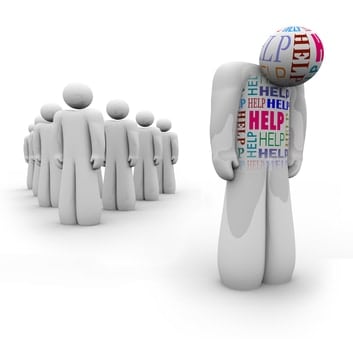People do self-sabotaging things all the time, but these behaviors aren’t the cause of self-sabotage.
They are the result of it.
When you get in your own way, limit yourself, or attract all the wrong outcomes in your life, something more subtle and powerful is going on. It is this hidden aspect of your life that you need to identify, accept and transform (in that order).
When you do, you will never look at life in the same way again. Better yet, your life will get easier, much easier. If you show the signs mentioned below, this is a virtual guarantee.
Your distorted perceptual filters are what you need to identify. These are the self-sabotaging lenses through which you view the world. Lenses are difficult to pinpoint because most of us are too focused on what we are seeing out there and not the lens through which we are looking.
We take the lens for granted. Still, it is the lens that defines what we see and what it all means.
If your lens is distorted, then you will automatically twist the real cause of your angst. Then, you’ll argue that your distorted perceptions are accurate while continuing to distort.
This is dangerous. And it can make you look like a fool.
Of course, you can see clearly when others have twisted views of life. And others can see yours. But can you see YOURSELF holding twisted views? This is the key to making sweeping changes in your life – the ones that have been so hard for you to come by.
Below are five signs that your lens needs to be tweaked. You be the judge of how they apply to you. You’ll also find short exercises that assist in the tweaking.
Real quick, I deeply admire anyone who calls into question their own distorted lens. It requires a level of personal maturity that is rare. And it leads to the deepest changes in feelings and behavior. So, read on with a humble, open mind. This is important stuff.
Here are the five signs that your lens is askew:
1. You believe life is singling you out for a pain campaign
Sometimes, life is grand. Your hard work pays dividends. Your friends, family, and colleagues keep their promises. You feel appreciated for what you do. And if there are surprises, they are pleasant. Groovy.
Or not. People also lie. They can take the credit for your hard work. They might betray you or set you up for failure. Or even worse, they may even set you up for failure and then criticize you. Things just break bad sometimes.
And that is life.
You may be tempted to feel like a special victim during the painful times. Feeling singled out might be unavoidable. Still, you’re not all that special. In fact, believing you’re under some special curse reserved just for you only keeps you from finding solutions from people who are able to understand.
On top of the unfortunate circumstances themselves, you now have to deal with the added burden that you’ve been singled out to suffer when everyone else is resting on easy street.
So, do this:
List the bad things that are happening to you. Then, do some research and find other people who have experienced similar circumstances. They are out there. Chances are 100% that you are not alone.
Now, learn how resourceful people deal with your particular challenge. Don’t get stuck in it. Attack the problem as if it were just another thing people have to deal with.
Warning: If you’re insistent that you are totally alone in your angst and resist finding solutions, then you may be sabotaging yourself. Learn more about why we sabotage ourselves by watching this free video.
 2. You jump on that first instinct to BLAME
2. You jump on that first instinct to BLAME
Everyone’s doing it, right? At the first sign of trouble, instinctively point fingers. And all hell breaks loose from there. It’s exhaustingly unproductive.
Are you going to join in the fray, see others as the cause of your problems, and dish out some revenge? Go right ahead. You can take lessons from third graders at any schoolyard in the world. And the more you play the game this way, the more you’ll be convinced of your victimhood, even when you win.
I wouldn’t expect anyone to suddenly become the Buddha and never feel the sudden urge to point fingers. I do think it’s fair to ask people (myself included) to chill out for a second before jumping on the blame train.
If you can take a deep breath and let it pass, then something magical happens. Your mind opens up and you suddenly gain the ability to look at the situation holistically.
And you inspire others to look at themselves. You know how it works.
You: Yeah, I know you didn’t get package out on time, Bob. I guess I could have had it ready for shipping earlier in the day. That might have made it easier for you. Sorry for any inconvenience.
Bob: Oh no – this one’s on me! You had the package ready in plenty of time. I just dropped the ball. Don’t worry about it, Mike!
Nice.
Of course, Bob could be an impulse blamer extraordinaire and seize this opportunity.
You: Yeah, I know you didn’t get the package out on time, Bob. I know I could have had it ready for shipping earlier in the day. That might have made it easier for you. Sorry for any inconvenience.
Bob: No kidding! If it weren’t for you, the package would have gone out. It’s people like you that screw up the entire system around here!
So, what? You think you just opened your belly for Bob to punch?
Nah. You see, now you know who Bob is. He just revealed himself to you. And that’s the thing about honestly taking responsibility for what you can. When you take responsibility, you learn who can reciprocate and who cannot. You inspire others to join you and at the same time learn who is unwilling. That’s incredibly valuable to know as you make future decisions about people.
When pointing the finger is your first course of action, you make it MUCH harder to sort out who has personal responsibility potential. This applies to EVERY aspect of life.
3. You live in a state of overwhelm.
It’s normal to feel overwhelmed when you are learning something new and important. And it’s common to be overwhelmed – temporarily – with almost anything complex.
If you’re chronically overwhelmed by the more typical aspects of living, then that’s a different issue.
People who make a list, break things down into manageable chunk sizes tend to get things done and remain free of overwhelm. Most adults know how to do this.
If you are resistant to empowering yourself in this way, then you might want to figure out why not.
For so many of us, a sticky attachment to helplessness is the culprit. Now, most adults cringe at the idea of feeling helpless. Yet, think deeply. Aren’t you more capable than you give yourself credit?
Negative psychological attachments are the root of many problems. If you feel chronically helpless in your life, then you must learn how attachments work to create self-sabotage. Watch this enlightening free video!
And here’s a simple, 4-step process for you if you are constantly dealing with cluttered, spinning thoughts about all you have to do. It clears your mind like a charm and only takes a couple of minutes to learn.
To make the 4-step process magically appear on this page, do us a favor and help spread the word by clicking a share button below:
Notice the difference? Say good-bye to cluttered thoughts! There is a well-researched reason why this simple process works, having to do with your brain’s default mode network. Read more here.
 3. The idea of saying no makes you want to just disappear.
3. The idea of saying no makes you want to just disappear.
There is no greater trap than saying yes to things you have no business saying yes to. A chronic pleaser discovers before long that saying yes to one thing really means saying no to other things – even other things you’ve said yes to.
You just can’t deliver on every request, regardless of what you are inclined to promise.
So, most people pleasers end up displeasing people when they don’t back up their agreements.
Saying no means that you understand your limitations and value what you have said yes to. You can only do this by saying no to distractions.
You’ll displease some people by saying no, but will end up commanding their respect as well.
Here’s a “no hack” that might work for you as a transition into saying no more of the time. I’ve used it with clients with success.
To get the no hack, do us a favor and click the share buttons just below – then the simple strategy will appear on this page! (If you’ve already shared this page – then the hack should already appear.)
4. You still resent your parents.
Do you still see your parents as blameworthy for the negative aspects of your personality? In your head, do you treat yourself the way they treated you?
For example, do you tell yourself that you’re not good enough or not as smart as so-and-so like your parents did? Do you predict personal failure like mom and dad used to predict?
Seeing your parents negatively reinforces all the angst of your childhood and keeps you attached to it. Adults see their parents as people. Imperfect people. People who made mistakes. People who had issues of their own. Most of all, people who have lives of their own.
Seeing your parents as people doesn’t mean that you condone their errors. It doesn’t even mean that you love or respect them. It merely means that you see them with more understanding than you did as a child.
Do you want to see your parents as people? Whether or not they were good at parenting, it will be good for you as a person if you do.
5. You don’t take good care of yourself.
This is hallmark of self-respect.
And here’s a very different take on it. When you don’t take care of yourself, you send a loud and clear message to others: It is your responsibility to take care of me.
This is a child’s message. You may not intend it, but that’s the message others receive. Yes, you could argue it. You could say, “No, I am not asking anyone to take care of me. If I don’t take care of myself, then that’s my problem.”
Wrong. Your self-care affects the people in your life. To learn how it affects them, ask. How does it affect you when I:
• don’t look after my health?
• don’t pick up after myself?
• don’t groom myself well?
• don’t manage my stress?
• don’t say no when I need to?
• don’t ask for help when I need it?
Chances are, you already have a good idea how it affects the people close to you. So, make it a goal to end the self-sabotage. In this case, the self-sabotage is setting you up for rejection.
Time for a lens upgrade?
Your most powerful weapon against these distortions is your own honest self-awareness. Everything you do to expand self-awareness contributes to your personal clarity and maturity as a free adult.
Tendencies toward self-sabotage distort your perspective and even set you up to receive more of what you hate in life. In fact, with self-sabotage, you may not even be motivated to create more happiness.
So, become aware of your distortions and how they lead to self-sabotage.
For example, do you:
• Attract people in life who tend to reject or betray you in some way?
• Tend to hang around controlling people?
• Think that if you attempt do something wonderful, people will judge you?
• Believe there is no point in going after goals because you will fail?
• Criticize yourself incessantly?
• Walk around with no sense of purpose and an empty feeling inside?
All of these and many, many more symptoms come from self-sabotaging distortions in your personal paradigm.
Learn more about how self-sabotage works to keep real solutions blurred – and learn to overcome it by watching this enlightening free video.








